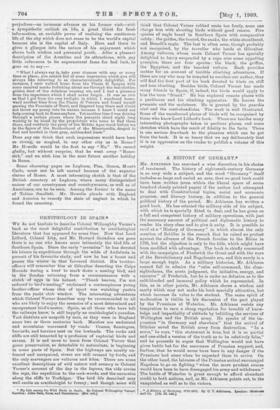A HISTORY OF GERMANY.* Mn. ATKINSON has exercised a wise
discretion in his choice of treatment. The histoty of eighteenth-century Germany is so very' wide a subject, and the word " Germany " itself includes so large and varied an area, that no good book could have been written (even within the liberal space of seven hundred closely printed pages) if the author had attempted to deal with Constitutional topics, social and economic progresa, and literary history, in addition to the general political history of the period, Mr, Atkinson has written a good book. He has selected the military side of his subject, with which be is specially fitted to deal, and he has given us a full and competent history of military operations, with just the necessary amount of political and diplomatic history to render hie story clear and to give it unity. It is possible to cavil at a "History of Germany" in which almost the only mention of Schiller is the remark that be raised no protest against the advance of the French frontier to the Rhine in 1792, but the objection is only to the title, which might have been modified with advantage. The book is chiefly concerned with the campaigns of Frederick the Great and with the wars of the Revolutionary and Napoleonic era, and this surely is a large enough topic. As a military historian, Mr. Atkinson cannot fail to admire the "calm self-command, the clear- eightedness, the acute judgment, the initiative, energy, and resource" of Frederick, but he is under no delusion as to the cold-blooded and immoral policy which he represented. In this, as in other points, Mr. Atkinson shows a wisdom and sanity which 'may not make his book specially attractive, but which increase its value to the student. The same spirit of moderation is visible in his discussion of the part played by the Prussians at Waterloo. Mr. Atkinson resists any temptation to earn a cheap reputation for breadth of know- ledge and impartiality of attitude by belittling the services of Wellington and the British army. He speaks of the im- pression "in Germany and elsewhere" that the arrival of Micher saved the British army from destruction. "In a sense," he says, "this statement is true, but it is so partial and one-sided a version of the truth as to be relatively false," and he proceeds to argue that Wellington would not have given battle but for the assurance of Prussian support, and, further, that be would never have been in any danger if the Prussian. had come when lie expected them to arrive. On the other band, the lateness of the Prussian arrival encouraged Napoleon to go on fighting "when the more prudent course would have been to have disengaged his army and withdrawn?' The battle of Waterloo is great enough to afford abundant credit to both nations, and, as Mr. Atkinson points out, to the vanquished as well as to the victors.
• A History of Germany, 1715.1810, By C. T. Atkinson. London s Methuen and Co. [12s. OA net.]










































 Previous page
Previous page